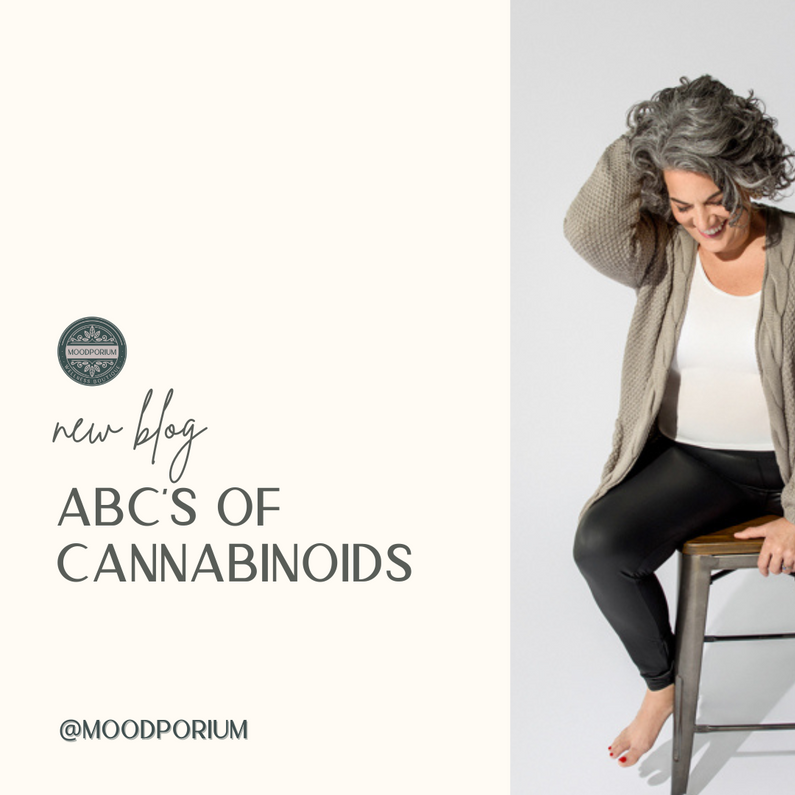ABCs of Cannabinoids
I feel the acronyms and terms in our industry have grown in the past two years since Delta 8 came out at a ridiculous rate. Here's an excellent guide for you to use as a refresher or to help guide you to the right products.
A cannabinoid is a naturally occurring compound in the cannabis (hemp or marijuana) plant. Currently, over 110 known cannabinoids are more likely to be discovered as studies continue.
CBDa is the mother of all cannabinoids. It's a non-psychoactive compound that serves as a precursor to CBD. More specifically, CBDA is decarboxylated to create CBD, meaning it is heated. Research has shown that CBDA produces antidepressant effects on rats at doses 10 to 100 times lower than CBD. This is due to CBDA's relationship with serotonin receptors. For this same reason, CBDA is further researched as an anti-nausea drug, with one study finding CBDA more effective at reducing nausea than CBD. Recently a study was done that shows some interesting findings on how CBDa can help with COVID; here is an article on Forbes.com, "Study Finds Cannabis Compounds Prevent Infection By Covid-19 Virus".
CBD is the central non-psychoactive portion of the cannabis plant. Studies have shown that CBD can treat chronic pain, inflammation, migraines, epilepsy, autoimmune diseases, depression, and anxiety.
CBG is a cannabinoid derived from young cannabis plants because it contains more CBG than fully developed plants. Like CBD, CBG has been used to combat pain without having the intoxicating effect of cannabinoids like THC. It has anti-inflammatory properties and is a great muscle relaxant. Studies have shown that CBG might help with IBS, Glaucoma, and Huntington's Disease and fight cancer cells.
CBN is a cannabinoid known to be a natural sedative and pain reliever. CBN acts as an anticonvulsant, which also benefits patients with seizure disorders, including epilepsy.
CBC may be up to 10 times more potent than CBD for treating stress and anxiety. It has significant anti-inflammatory, pain-reducing, antiviral, anti-tumor, and bone-growth-stimulating properties. It's the 3rd most prominent cannabinoid found on the cannabis plant, behind CBD and THC, and is non-psychoactive similar to CBD>
HHC is ahexahydrocannabinol, a hydrogenated form of THC naturally present in varieties of cannabis in trace amounts. HHC has similar effects to THC, but the most significant difference is it has no double bond in its carbon chain. HHC is commonly converted in a laboratory using a hydrogenation process similar to vegetable oil to margarine.
Because of its conversion process, it has two extra hydrogens, making it more stable for shelve life preservation.
Delta 8 is a psychoactive cannabinoid found in the cannabis plant in small amounts. Like Delta 9, D8 produces feelings of euphoria, relaxation, and potential pain relief, but they're a lot milder. Companies have taken CBD isolate and converted it into this rare cannabinoid, making it legal under the 2018 Farm Bill.
Delta 9 (Compliant) is a psychoactive cannabinoid derived from the hemp plant. Essentially, the 2018 Farm Bill legalized cannabis-based products that consist of less than 0.3% THC on a dry weight basis. That means that if you can create a delta-9 gummy (derived from hemp) and adhere to the THC limit, it is considered legal at the federal level. Traditional Delta 9 is also known as marijuana.
Delta 10 is a psychoactive cannabinoid found in trace amounts in the cannabis plant, typically in Sativa strains. D10 is commonly reported to provide energizing and euphoric effects and is less potent than D9.
Delta 11 is a chemical compound produced in the liver after your body processes THC. It's what your body turns THC into after you ingest it. The main benefit of Delta-11 is its more potent version of D9.
THCh has a 6-carbon alkyl sidechain, while regular THC has only a 5-carbon sidechain. This means the psychoactive effects will be longer and 10x more potent than Delta 9. The effects of THCh tend to be more relaxing.
THCjd is a rare and largely unknown cannabinoid with an 8-carbon alkyl sidechain, reportedly 19x more potent than Delta 9 and 25x stronger than Delta 8.
THCo is a synthetically processed cannabinoid that starts as CBD isolate turned into Delta 8, but then manufacturers process it further by adding a chemical known as acetic anhydride. THCo effects can be a lighter version of using psilocybin mushrooms with a hint of LSD.
THCp is a rare and largely unknown cannabinoid with a 7-carbon alkyl sidechain, reportedly 10x more potent than Delta 9.
THCv is a unique cannabinoid with psychoactive properties that has potential therapeutic benefits for appetite control and providing a focused, energetic sense of euphoria. The effects of this cannabinoid are short-lasting, similar to other cannabinoids like THC or CBD. Research studies have been done with THCV with its anticonvulsant properties to help diabetes and anti-inflammatory agent.
Recent Posts
-
My Top Ten Items For Love (Or Lust)
One of the best things personally that Delta 8 has changed for me is my sex life. WOOOOWWWWW. I have …Feb, 06, 2023 -
Top Five Tips to Get Started With a Cannabis Routine that Works for You in 2023
If you're like every person at the start of 2023, you had a slew of resolutions or intentions you …Jan, 08, 2023 -
Looking at 2023
Wow. If you’re reading this, you survived 2022. Some of us thrived, but we all survived. And if surv …Dec, 27, 2022






